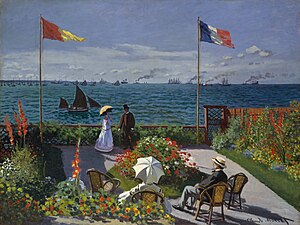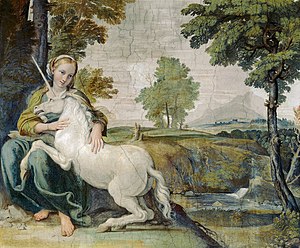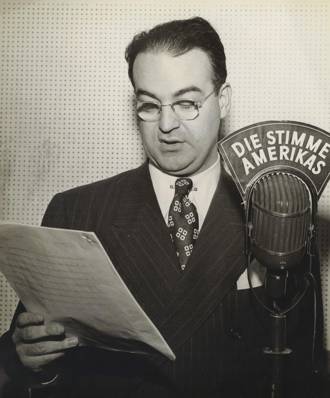Layout
Partisan arrangements, dodgy dollars, a mysterious union of strings, and a hole that became a monument
-
Walter Roberts broadcasting on Voice of America. Roberts' book, published in 1973, drew the ire of the Yugoslav government
This Signpost "Featured content" report covers material promoted from 22 March through 28 March. Text may be adapted from the respective articles and lists; refer their page histories for attribution.
Featured articles
Four featured articles were promoted this week.


- German–Yugoslav Partisan negotiations (nominated by Peacemaker67) During the redeployment of Josip Broz Tito's headquarters and partisans across the Nazi puppet state of Croatia in August 1942, a group of Germans from the Organisation Todt were captured. The leader of the group had been tasked by the German Abwehr with making contact with the partisans and a series of prisoner swaps were initiated. By March 1943, the partisans' military situation had deteriorated, and to forestall continuing German attacks they again entered into tentative negotiations regarding prisoner swaps and a possible truce. The Germans saw a possibility that the partisans may oppose a British landing, because this would have given support to the Royalist Chetniks. There was an exchange of "between 600 to 800 Partisans in total" by 1945. Tito stated in 1978 that the objective of the negotiations was "solely to obtain German recognition of belligerent status for the Partisans".
- 1804 dollar (nominated by RHM22) The 1804 dollar is an odd bird. Despite the date, none with this date were minted until the 1830s, although silver dollars had actually been minted in 1804, but dated 1803. Large silver coins, such as the Maria Theresa thaler, were used worldwide as standard trade coins. The introduction of the US silver dollar in 1794 added another coin to the trade, and large numbers of dollars were exported by traders. From 1806, the production of silver dollars was officially halted (none had been struck since March 1804) in favour of the minting of smaller denominations; this meant that there was small change available to the US economy, but the exporting of coins stopped. The "1804" dollars were struck when Edmund Roberts, who headed a trade mission to the Far East, requested sets of coinage to be presented to kings and sultans as gifts. The date may have been chosen because the Chief Coiner thought that there had been coins minted with that date; he was anxious to avoid angering coin collectors!
- Deinocheirus (nominated by FunkMonk and IJReid) Deinocheirus is a genus of ostrich dinosaur. They're called that as they have a superficial resemblance to the bird. Living about 70 million years ago, they were big- one specimen was about 11 m (36 ft) long and weighed 6.36 t (224,000 oz).
- M-theory (nominated by Polytope24) M-theory is a unification of "all consistent versions of superstring theory." It's not yet been completely formulated, but it's reckoned that the theory "should describe two- and five-dimensional objects called branes and should be approximated by eleven-dimensional supergravity at low energies." M-theory was introduced by Edward Witten, whose "proposal was based on the observation that the five string theories can be mapped to one another by certain rules called dualities and are identified by these dualities."
Featured lists


Seven featured lists were promoted this week.
- List of Navy Midshipmen head football coaches (nominated by A Texas Historian) The United States Naval Academy is represented in college football by the Navy Midshipmen football team. Since 1882, the team has had 36 head coaches. The present coach is Ken Niumatalolo.
- List of Knights Grand Cross of the Royal Victorian Order appointed by King Edward VII (nominated by Noswall59) Admission to the Royal Victorian Order is the personal gift of the "reigning monarch of the United Kingdom and several Commonwealth realms"; it recognises "distinguished personal service to the order's Sovereign" (the monarch), their family and their viceroys. This list is of those men given the Knight Grand Cross of that order by King Edward VII.
- List of York City F.C. players (25–99 appearances) (nominated by Mattythewhite) York City Football Club was formed in May 1922. Since then "more than 300 players had completed their York career after playing in at least 25 and fewer than 100 senior competitive matches." The list includes Charlie Lemons, Len Butt, Fred Laycock, Andy Leaning and Michael Gash.
- World Fantasy Award for Best Artist (nominated by PresN) The World Fantasy Award for Best Artist is an annual award for the "artists of works related to fantasy released in the preceding calendar year." It's awarded at the World Fantasy Convention; the winners are decided by a selection process which starts with an attendee ballot to select two finalists, followed by a nomination of three more by a panel of fantasy authors, who then vote on the overall winner. The winner gets a caricature bust of H. P. Lovecraft.
- List of scheduled monuments in Sedgemoor (nominated by Rodw) They do say that if you walk through the ankle-high mist on the levels you'll be dead within the fortnight. Never mind- you can spend the fortnight visiting these marvellous monuments. You'll have probably seen Brent Knoll, a flat-topped hill close to the M5 motorway.
- 63rd Academy Awards (nominated by Birdienest81) The 63rd Academy Awards were held in March 1991. Dances with Wolves won Best Picture and six other awards. Unfortunately, the wolves could not make the show, as they had a previous engagement with ghosts, mobsters, and dopa.
- List of cricketers who have carried the bat in international cricket (nominated by Vensatry) In the game of cricket, when an opening batsman remains not out at the end of the
fortnightgame, they are said to have "carried the bat". The expression refers back to a time when batsmen shared bats, and the outgoing batsman would leave their bat on the field to be used by the incoming player. An equivalent expression, "carrying the box", fell out of use after an outbreak of crabs .
Featured pictures
23 featured pictures were promoted this week.






- Audi e-tron (created by Thomas Wolf (Der Wolf im Wald), retouched by: LiveChocolate, nominated by Crisco 1492) The Audi e-tron is a series of cars by Audi, using either a combination of internal combustion and electric engines in the same car (hybrids) or solely electrically-powered. This photograph shows an e-tron concept car, shown at the 2009 International Motor Show in Frankfurt. It is powered by four electric motors, providing four-wheel drive.
- Eight Bells (created by Winslow Homer, nominated by Crisco 1492) Eight Bells is an oil painting by Winslow Homer of two fishermen holding sextants. The "eight bells" refers to the nautical time, which is noon; the fishermen are using there sextants to determine the highest position of the sun, and hence local apparent noon. They can then calculate their longitude.
- Garden at Sainte-Adresse (created by Claude Monet, nominated by Crisco 1492) A woman and man are in conversation on a terrace overlooking La Manche at Sainte-Adresse. This peaceful but banal scene is miles away from the dramatic landscapes and scenes predominant in Western art; it is part of the revolution in painting forged by the Impressionists.
- Clanculus corallinus (created by Llez, nominated by Armbrust) Now you know what a globose-conic shape with an acute spire looks like.
- Embryonic stem cells (created by Ryddragyn, nominated by The Herald) The blob in the centre of this photograph is a colony of human embryonic stem cells. They have been taken from the inner cell mass of the blastocyst stage of a human embryo, five days after fertilisation. Their importance lies in the fact that they are pluripotent, that is, they can differentiate into any kind of cell found in the human body. The first clinical trial using stem cells was on patients with spinal-cord injuries. Started in 2009, it was halted in 2011 due to financial reasons.
- [[:|Alison Bechdel]] (created by Riccardo De Luca for the MacArthur Foundation, nominated by Crisco 1492) Alison Bechdel, an American cartoonist, is here seen drawing a self-portrait, using the image on the screen of a digital camera as an aide-memoire. The eponymous Bechdel test is applied to works of fiction; they pass if they have two women who talk to each other about something other than a man.
- Descent of the Soyuz TMA-14M (created by NASA, nominated by The Herald) March 12, 2015, shortly after local sunrise over central Asia, this Soyuz TMA-14M spacecraft floated over a sea of golden clouds during its descent by parachute through planet Earth's dense atmosphere. TMA-14M is the 123rd flight of a Soyuz spacecraft, the first flight launching in 1967. The Soyuz remained docked to the space station for the Expedition 42 increment to serve as an emergency escape vehicle until undocking and landing as scheduled in March 2015.
- Dishes with Oysters, Fruit, and Wine (created by Osias Beert the Elder, nominated by Hafspajen) Osias Beert was a Flemish painter who specialised in breakfasts. His paintings were built up using glazes of semi-transparent oil colour to give depth and a wide range of colours. Beert's paintings are called in Dutch ontbijtjes, or "little breakfasts"- here there are oysters, honey, chestnuts, raisins, sugared almonds, bread and meringues, with a glass of Madeira wine.
- Étienne Maurice Gérard (created by Jacques-Louis David, nominated by Crisco 1492) Étienne Maurice Gérard had a military and political career stretching from 1791 to his death in 1852. He must have been remarkably adaptable, as the only hiatus in his career was between 1815 and 1817, when he was hiding out in Brussels after the defeat of Napoleon at the Battle of Waterloo. Gérard also managed to survive the retreat from Moscow.
- Frida Kahlo (created by Toni Frissell, restored and nominated by Adam Cuerden) This photograph of Mexican artist Frida Kahlo was part of a 1937 photoshoot by Toni Frissell for fashion and lifestyle magazine Vogue. Kahlo was being photographed for an article entitled "Señoras of Mexico", published in the US edition of 1 October 1937. The photograph used in the magazine was of Kahlo standing upright against the agave, holding her rebozo above her head; it was colourised. She was referred to as "Mrs Diego Rivera", as she often was at the time: besides a 1939 purchase by the Louvre, she was largely ignored by the mainstream art world during her lifetime, and wouldn't gain widespread recognition until decades after her death.
- Charles Gravier, comte de Vergennes, and Annette Duvivier, Comtesse de Vergennes (created by Antoine de Favray, nominated (1 2) by Hafspajen)Such a cute couple. Excellent portraits of the diplomat Charles Gravier, comte de Vergennes and wife, by Antoine de Favray. A good example of French orientalist art and turquerie. Gravier played an important role in Franco-Ottoman relations, both as ambassador and later as French Minister for Foreign Affairs. He commissioned the work from Antoine de Favray while in Constantinople. Favray was a French painter known for his portraits of personalities of the Ottoman Empire, as well as paintings of Grand Masters in Malta.
- Religion saved by Spain (created by Titian, nominated by Alborzagros) Religion saved by Spain is a painting by Titian completed in 1575. It's a mix of allegory and political propaganda, depicting the defeat of a Turkish fleet at the Battle of Lepanto.
- Mariana (created by John Everett Millais, nominated by Hafspajen) With the painting technique of an angel and the imagination of a Hackney barmaid, John Everett Millais combined "precision, attention to detail, and stellar ability as a colorist" with ponderous didacticism, to produce works of art which told a moral story. In the stained glass windows the portrayal of the Annunciation promises a virgin birth, but the broken snowdrop in the coat of arms symbolises a loss of virginity; it is already too late. The motto In coelo quies (In Heaven there is rest) was the motto of Cardinal Wiseman. Millais had a certain non-committal fascination with the pomp and ceremony of the Roman Catholic church, to which attitude John Ruskin refers when he draws attention to Mariana's boredom with her "idolatrous toilet table". Mariana is based on a poem by Alfred comma Lord Tennyson- "With blackest moss the flower-plots, Were thickly crusted, one and all, The rusted nails fell from the knots, That held the pear to the gable-wall. dah dah dah The sparrow's chirrup on the roof, The slow clock ticking, and the sound, Which to the wooing wind aloof, The poplar made, did all confound." Thanks Alf, we'll let you know.
- François-Henri d'Harcourt (created by Jean Honoré Fragonard, nominated by Alborzagros) Portrait of François-Henri d'Harcourt by Jean Honoré Fragonard, oil on canvas is one of four of the "Fantastical Portraits", a series of portraits by the French painter Jean-Honoré Fragonard, mostly dating to 1769. It is said they were executed in a single hour, from which they gained the Italian name fa' presto (made quickly). François-Henri d'Harcourt was Count Lillebonne, a French general, duke and peer of France, He emigrated during the French Revolution, and he became a representative of Louis XVIII of France to the British government (1792–1800).
- The Stolen Kiss (created by Jean-Honoré Fragonard, nominated by Alborzagros) Jean-Honoré Fragonard's works display the kind of eroticism and voluptuousness and the liking for romantic folly that was popular before the French Revolution among French aristocrats. The Stolen Kiss was no different. Fragonard includes scenes of voyeurism in his paintings. This scene is depicting the stolen kiss in lavish surroundings, containing luxurious details of textures, silks and lace, like the rug with flower pattern, silk draperies, her shawl on the chair, the elegantly clad ladies that are visible through the open door. For half a century or more, Fragonard was so completely ignored that Wilhelm Lübke his 1873 art history volume omits the very mention of his name. (Of course, Lübke was an anti-Semite and also omitted Jews, so there is that.) On December 5, 2013, Bonhams sold the Fragonard portrait of François-Henri duc d'Harcourt for $28,058,081 – setting a world record price for the artist at auction.
- Stitching the Standard (created by Edmund Leighton, nominated by Brandmeister) Painted in 1911, this canvas by Edmund Blair Leighton depicts a woman stitching an Austro-Hungarian military flag, with its crowned two-headed black eagle on a gold field. The painting was sold at Christie's in 1928 under the title Preparing the flag to the art dealer W.W. Sampson, who was the leader of an illegal knockout ring of dealers. The inebriated Sampson drowned in a bathtub in Brighton in 1929, leaving an estate worth £10. The painting seems to have gone out of sight until art dealer Richard Green bought it at a Phillips auction in 1977 under the title Awaiting his Return. Green sold it to a private collector, and it re-appeared as Stitching the Standard at a Sotheby's auction a year later. In 2011, the painting went back to Sotheby's, where it was sold for an eye-watering £373,250. Edmund Leighton reworked the subject in his Hostage of 1912 using the same model, this time with blonde hair, sitting on the ramparts doing embroidery. Paula Rego, in her 1987 painting The Policeman's Daughter, subverts the whole genre; the daughter sits by a window through which moonlight streams, polishing her father's jackboots.
- Blue petrel (created by JJ Harrison, nominated by JJ Harrison) The word "petrel" is derived from Saint Peter and the story of his walking on water. This is in reference to the petrel's habit of appearing to run on the water to take off. This wonderful photo of a blue petrel from our long time contributor of fine work in the nature field, JJ Harrison is a fine example of one of nature's more fortunate creatures using its most precious skill. And the bird looks good as well. Leaves us to ask, if you could fly, would you? Silly question, contact ground control on 121.8, have a good flight...
- Papilio machaon (created by Zeynel Cebeci, nominated by Crisco 1492) Wonderful macro photo of a butterfly, this is the wing underside view of a swallowtail papilio machaon in Erdemli, Turkey. In some countries, P. machaon and its subspecies are protected by law. Papilio machaon machaon is protected by law in six provinces of Austria, Czech Republic, Slovakia, Hungary, Romania, and Moldova. The species is protected in the United Kingdom, and subsp. verityi is protected in India.
- Self-Portrait at the Age of 63 (created by Rembrandt, nominated by SchroCat) Self-Portrait at the Age of 63 is a self-portrait by the Dutch artist Rembrandt, now in the National Gallery, London. Dating to 1669, it was the last in his long series of self-portraits, but it is not currently on display. Rembrandt created nearly one hundred self-portraits during his lifetime, including approximately fifty paintings, thirty-two etchings, and seven drawings. The self-portraits create a visual diary of the artist over a span of forty years. "Hmm, I think I will paint me, again. Hand me the canvas please!"
- The Kiss (created by Gustav Klimt, nominated by Crisco 1492) A golden Kiss? Gustav Klimt's 'Golden Phase' was marked by positive critical reaction and financial success. Many of his paintings from this period include gold leaf. Klimt had previously used gold in his Pallas Athene (1898) and Judith I (1901), although the works most popularly associated with this period are the Portrait of Adele Bloch-Bauer I (1907) and this wonderful work of art The Kiss (1907–08).
- A Virgin with a Unicorn (created by Domenichino and Annibale Carracci, nominated by Hafspajen) A Virgin with a Unicorn is a painting by Domenico Zampieri on display at the Palazzo Farnese in Rome. Domenico Zampieri (or Domenichino) (1581–1641) was an Italian Baroque painter of the Bolognese School, a rather talented one. This school flourished in Bologna, between the 16th and 17th centuries, and rivaled Florence and Rome as the center of painting in the Italian Baroque era. The painting depicts Giulia Farnese, mistress to Pope Alexander VI (Rodrigo Borgia). The Pope fell in love with Giulia and decided to make her his mistress. … Well, so much for that unicorn.
- The Mystical Nativity (created by Sandro Botticelli, nominated by SchroCat) The Mystical Nativity by Sandro Botticelli is on display at the National Gallery in London and depicts a scene of joy and celebration, of earthly and heavenly delight, with angels dancing at the top of the painting. The Greek inscription at the top translates as: "This picture, at the end of the year 1500, in the troubles of Italy, I Alessandro, in the half-time after the time, painted, according to the eleventh [chapter] of Saint John, in the second woe of the Apocalypse, during the release of the devil for three-and-a-half years; then he shall be bound in the twelfth [chapter] and we shall see [him buried] as in this picture".
- Dorf in den Berner Alpen (created by Adolf Mosengel, nominated by Hafspajen) Are the people next door getting under your skin? We have the perfect place: the Alps. Et voilà, Dorf in den Berner Alpen by German painter Adolf Mosengel (1837–1885) – only 68 x 50 cm, but never mind the width, feel the quality. Mosengel was a landscape painter from Hamburg, Germany. He had built a reputation painting Alpine scenes, like this one, and he later turned to scenes from Westphalia.
-
File:Jean-Honoré Fragonard - The Stolen Kiss.jpg]]
Good articles
This is a new feature, including a list of all the good articles promoted during the week covered in this report (22-28 March 2015). Please tell us what you think! This week, thirty-seven good articles were promoted.


-
Stitching the Standard by Edmund Leighton, one of the lesser known paintings by the artist, was digitized by Sotheby's before its "disappearance" into a "private collection".]]
-
am moving here some day







![File:Jean-Honoré Fragonard - The Stolen Kiss.jpg]]](http://upload.wikimedia.org/wikipedia/commons/thumb/9/9d/Jean-Honor%C3%A9_Fragonard_-_The_Stolen_Kiss.jpg/590px-Jean-Honor%C3%A9_Fragonard_-_The_Stolen_Kiss.jpg)


![Stitching the Standard by Edmund Leighton, one of the lesser known paintings by the artist, was digitized by Sotheby's before its "disappearance" into a "private collection".]]](http://upload.wikimedia.org/wikipedia/commons/thumb/0/0c/Leighton-Stitching_the_Standard.jpg/238px-Leighton-Stitching_the_Standard.jpg)


Discuss this story